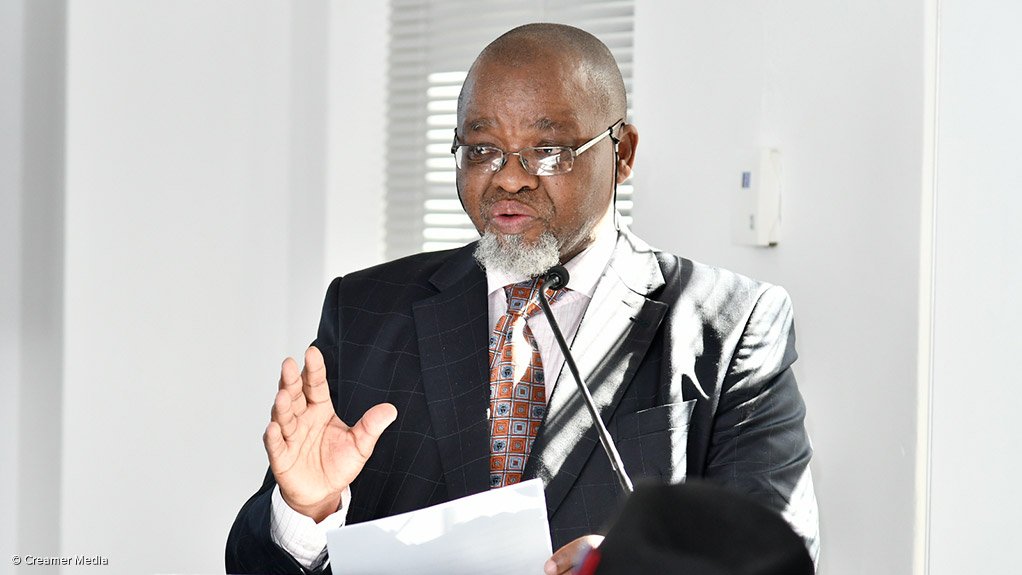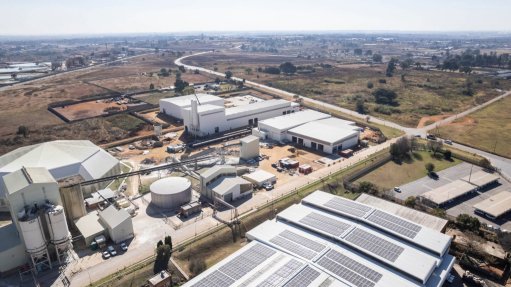Mining industry has critical role in closing energy supply gap – Mantashe


Mineral Resources and Energy Minister Gwede Mantashe
Photo by Creamer Media's Donna Slater
Mineral Resources and Energy Minister Gwede Mantashe is convinced that mining companies can supplement State-owned Eskom’s supply of electricity, and that this will be critical for narrowing the electricity supply and demand gap, thereby improving South Africa’s mining industry global ranking, which is in the bottom quartile on both investment attractiveness and policy perception indexes by research organisation Fraser Institute’s 2022 survey of mining companies.
“A success story is registered in the performance of Gold Fields, which registered a 10% production growth despite the 9% decline year-on-year in the sectors’ overall production. This is because they completed their 50 MW plant, which is giving them enough energy and registered some surplus. Therefore, the industry’s investment in expanding its own electricity capacity to power its operations gives us hope,” Mantashe said at the Minerals Council South Africa’s 133rd annual general meeting, in Johannesburg, on May 31.
He assured members of the Minerals Council that the National Energy Regulator of South Africa was standing ready to process additional registrations to add to the 4 050 MW that were registered in the 2022/23 financial year.
“As per our announcement during the department’s budget vote, we will, in this financial year, procure 10 000 MW of renewable energy under Bid Windows 7 and 8, 3 000 MW of gas-to-power, 2 500 MW of nuclear energy, and 1 230 MW of battery storage,” he promised, emphasising the need to ensure baseload security.
“Why do I think coal is the future? I don't talk coal. I talk baseload. Renewables, without a partner technology to provide baseload, will not help us industrialise. As we increase the contribution of renewables, we must equally increase the support of baseload. It can be batteries, it can be nuclear, it can be a bit of coal,” he said.
However, despite efforts to improve generation capacity, Mantashe reiterated that there was significant concern regarding the lack of grid capacity in the Northern Cape, Western Cape and Eastern Cape, which would undermine the intensive efforts aimed at addressing the country’s energy crisis.
He implored the industry to have faith in President Cyril Ramaphosa’s undertaking in his State of the Nation address to invest in new transmission lines and substations.
In addition to the crippling impact of South Africa’s electricity crisis on the mining industry, Mantashe also pointed to the dysfunctionality of the country’s logistics network, both in terms of rail and ports, which had significantly contributed to the Fraser Institute's downgrade and had impacted directly on the performance of the mining sector.
“Regarding the constraints in the rail network and port systems, we are particularly satisfied with the Mineral Council’s collaborative efforts with Transnet to speed up the interventions aimed at improving our rail and port infrastructure. Resolving these limitations will push the mining sector to greater heights and attract new investments,” Mantashe assured.
He pointed out that, despite these challenges, recent data supported by the South African Revenue Service and the Minerals Council indicated that the mining sector remained a “strong pillar” of the South African economy.
“The data shows that, even as the sector’s production declined between 2021 and 2022, the value of production increased from R1.1-trillion to R1.18-trillion. Most importantly, the sector contributed R89-billion in corporate tax and a further R28-billion to the country's revenue through royalties, thereby keeping its percentage contribution to the gross domestic product at 7.53%,” he said.
“The crux of the matter is that the mining sector continues to contribute meaningfully to the country’s economic reconstruction and recovery. Therefore, we must work together to ensure that the sector becomes globally competitive.”
VALUE ADD
However, re-elected Minerals Council president Nolitha Fakude argued that the value added by the mining industry was not just financial.
“Through our total economic contribution, we have enabled local companies to grow and thrive by being very deliberate about procuring from local suppliers in our host communities – those owned by black South Africans and those owned by women and young people,” she said.
She reported that the mining and quarrying sector spent R504-billion in 2022 on buying goods and services, and that it strove to allocate between 60% and 80% of its yearly procurement expenditure on historically disadvantaged South African-empowered companies, which included black-owned, women-owned and youth-owned companies.
In this light, she noted that the mining industry grew employment to nearly 469 000 during 2022 from 460 000 the year before. Mining industry employees’ earnings of R174-billion were substantially higher than the R165-billion reported a year before. Moreover, the sector spent more than R5-billion on human resources development, with a further R1.7-billion paid to the skills development levy.
In addition, she reported that the industry spends more than 1% of its net profit after tax on community development projects every year, with mining companies often implementing social development initiatives before they even start production or selling products.
Partnerships, industrywide learnings and improvements in technologies were fundamental drivers of what Fakude said was a record safety performance during 2022, when the industry recorded its lowest number of fatalities.
“Still, this means that 49 people did not go home to their families in 2022, and our quest for zero fatalities must continue,” outgoing Minerals Council CEO Roger Baxter added, stating that the leadership journey to zero harm must continue after he departs. He did, however, note the remarkable improvement over the 551 industry deaths that occurred in 1992 when he first joined the then-Chamber of Mines.
He also noted that the Minerals Council had played a significant lobbying role in helping to shape the national discourse that would enable the most substantial structural reform over the past two decades within the energy sector, leading to government’s pivotal decision to remove the cap on the size of embedded energy projects.
“The government has eventually accepted our view that the future of new power generation should rest with the private sector,” he said, reflecting Mantashe’s remarks earlier.
He also noted that the Minerals Council had invested significant effort with members engaging government and Transnet on the country’s rail and ports crisis. He highlighted Ramaphosa’s recent announcement regarding the National Logistics Crisis Committee, in which the Minerals Council and its members will play a major role. As it stands, the mining industry accounts for 80% of Transnet Freight Rail’s yearly revenue and half of Transnet’s group revenue.
“While the Minerals Council and its bulk commodity members are in regular engagement with Transnet’s board, executive and management on four key export channels, the challenges with logistics affect the entire economy and pose a risk as severe as – If not more severe than – Eskom,” Baxter warned.
“We need urgent and consolidated action from the government, Transnet and business to stabilise Transnet’s performance and to rapidly bring private sector participants into the rail sector as outlined in the National Rail Policy White Paper. Private sector concessions at the ports to manage the transhipment of products are essential to addressing bottlenecks in our exports and imports.”
He confirmed that the Minerals Council would work with Business Unity South Africa and Business Leadership South Africa within structures set up with the government to address ongoing crime and corruption.
Article Enquiry
Email Article
Save Article
Feedback
To advertise email advertising@creamermedia.co.za or click here
Comments
Press Office
Announcements
What's On
Subscribe to improve your user experience...
Option 1 (equivalent of R125 a month):
Receive a weekly copy of Creamer Media's Engineering News & Mining Weekly magazine
(print copy for those in South Africa and e-magazine for those outside of South Africa)
Receive daily email newsletters
Access to full search results
Access archive of magazine back copies
Access to Projects in Progress
Access to ONE Research Report of your choice in PDF format
Option 2 (equivalent of R375 a month):
All benefits from Option 1
PLUS
Access to Creamer Media's Research Channel Africa for ALL Research Reports, in PDF format, on various industrial and mining sectors
including Electricity; Water; Energy Transition; Hydrogen; Roads, Rail and Ports; Coal; Gold; Platinum; Battery Metals; etc.
Already a subscriber?
Forgotten your password?
Receive weekly copy of Creamer Media's Engineering News & Mining Weekly magazine (print copy for those in South Africa and e-magazine for those outside of South Africa)
➕
Recieve daily email newsletters
➕
Access to full search results
➕
Access archive of magazine back copies
➕
Access to Projects in Progress
➕
Access to ONE Research Report of your choice in PDF format
RESEARCH CHANNEL AFRICA
R4500 (equivalent of R375 a month)
SUBSCRIBEAll benefits from Option 1
➕
Access to Creamer Media's Research Channel Africa for ALL Research Reports on various industrial and mining sectors, in PDF format, including on:
Electricity
➕
Water
➕
Energy Transition
➕
Hydrogen
➕
Roads, Rail and Ports
➕
Coal
➕
Gold
➕
Platinum
➕
Battery Metals
➕
etc.
Receive all benefits from Option 1 or Option 2 delivered to numerous people at your company
➕
Multiple User names and Passwords for simultaneous log-ins
➕
Intranet integration access to all in your organisation

















